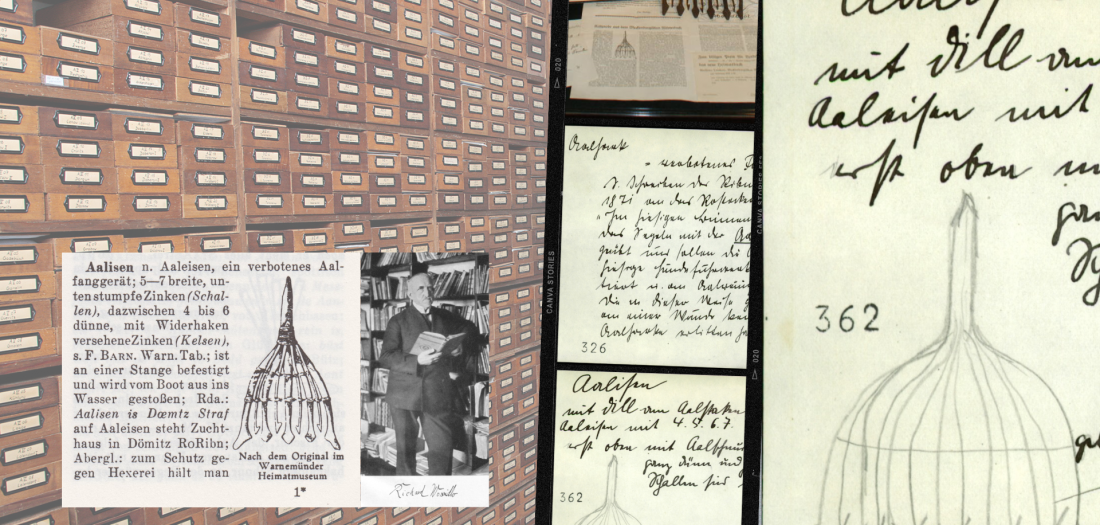From the note box to the Internet and back: Low German digital and networked
A digital network of Low German dialect dictionaries and their sources is being developed
16.05.2022 | General, Press Releases

© Digital Wossidlo Archive and Rostock University Library, note box in the Wossidlo Archive in Rostock, receipts and original drawings by Hermann Teuchert for the dictionary entry "Aalisen
Research on dialects and regional languages has a long tradition at both the University of Rostock and the University of Trier. With the subsequent digitization of numerous printed dictionaries, their online presentation, and their integration into a digital dictionary network, the Trier Center for Digital Humanities (TCDH) at the University of Trier, together with numerous partners, has done fundamental work for today's linguistic research over the past two decades. In Trier, the German dictionary of Jacob Grimm and Wilhelm Grimm and the Goethe dictionary, among others, have been digitized, and alliances on Middle High German and West Middle German regional languages have been established and networked via a cross-dictionary structure. The Institute for German Studies at the University of Rostock, with its professorship for Low German Language and Literature and the Wossidlo Research Center for European Ethnology/Volkskunde, focuses on the North German regional language and regional literature and on the regional and everyday culture of Mecklenburg, respectively. The traditionally strong collaboration between these two Rostock research areas can be seen, among other things, in their cooperation on the Mecklenburg Dictionary.
The Mecklenburgische Wörterbuch is one of the large-scale scientific dialect dictionaries and represents the most important access to the vocabulary of the Mecklenburg dialect. Simultaneously, it is currently the only complete large-scale dictionary for the Mecklenburg-Vorpommern language area. It provides comprehensive information on the meaning and usage as well as on the grammar of regional lexemes on the basis of one million oral and written source documents, which are classified dialect-geographically and linguistic-historically and partly also illustrated cartographically. Compiled by the folklorist Richard Wossidlo together with the dialectologist Hermann Teuchert, it presents not only Low German vocabulary but also folkloristic, agrarian and social historical sources and combines in an exemplary manner the characteristics of a large-scale dictionary with the character of an ethnographic-historiographic encyclopedia. Thus, the Mecklenburg Dictionary represents an invaluable testimony to the regional linguistic and cultural history of the 19th and the first half of the 20th century.
At the beginning of this year, a new project for the digitization and networking of lexicographic sources and materials for the Low German-speaking region was launched under the title Wossidlo-Teuchert online, which is funded by the German Research Foundation (DFG). WossiDiA is the name for the digital version of Richard Wossidlo's card index system, on which the Mecklenburg Dictionary is based. In 2014, WossiDiA was launched online by the Wossidlo Research Center and has since been continuously expanded into a research environment that can be used across disciplines.
The project team includes Prof Andreas Bieberstedt (Institute of German Studies at the University of Rostock), Dr Christoph Schmitt and Dr Petra Himstedt-Vaid (Wossidlo Research Center for European Ethnology/Volkskunde), Dr. Holger Meyer (Chair of Database and Information Systems), Karsten Labahn (Rostock University Library), and Dr Thomas Burch (TCDH). In addition to making the long out-of-print edition of the dictionary, which was produced between 1937 and 1992 and is now only available in the reference collections of larger libraries, they are also pursuing the goal of networking it with the digital source archive and with the other dictionaries in the Trier dictionary network. In this way, Low German and High German keywords can be searched for and compared across several dictionaries in the context of higher-level queries, and lexicological, dialectological, linguistic-historical, comparative, and even ethnological questions can be pursued.
As a pilot project, “Wossidlo-Teuchert online” is also intended to create the basis for the future digital processing and networking of other Low German dictionaries. In its conception, the project is oriented towards the premises of so-called Open Science with regard to interoperability and sustainability by ensuring the connection to existing interconnected networks as well as the integration of further sources through the programming of open interfaces. The sustainability of the results is ensured by the consideration of international standards of the Digital Humanities as well as the long-term preservation of the research data at the TCDH and the Rostock University Library.
Contact persons:
Dr. Thomas Burch
Kompetenzzentrum – Trier Center for Digital Humanities
Prof. Dr. Andreas Bieberstedt
Institut für Germanistik – Universität Rostock
Tel. +49 381 498-2550
Dr. Petra Himstedt-Vaid
Wossidlo-Forschungstelle für Europäische Ethnologie/Volkskunde – Universität Rostock
Tel. +49 381 498-1051
Karsten Labahn
Universitätsbibliothek Rostock
Tel. +49 381 498-8691 / 8776
Dr. Holger Meyer
Lehrstuhl für Datenbank- und Informationssysteme – Universität Rostock
Tel. +49 381 498-7597

